初中英语(仁爱版)八年级上册知识点梳理
初中英语 仁爱版八年级上册Unit1 Topic 3知识点
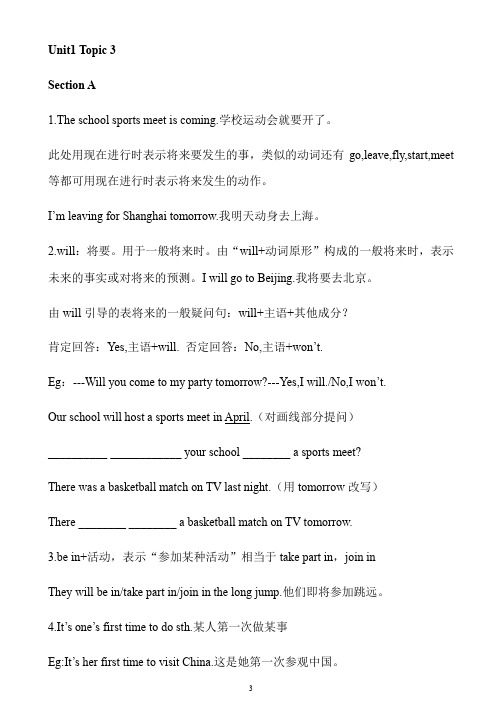
Unit1 Topic 3Section A1.The school sports meet is coming.学校运动会就要开了。
此处用现在进行时表示将来要发生的事,类似的动词还有go,leave,fly,start,meet 等都可用现在进行时表示将来发生的动作。
I’m leaving for Shanghai tomorrow.我明天动身去上海。
2.will:将要。
用于一般将来时。
由“will+动词原形”构成的一般将来时,表示未来的事实或对将来的预测。
I will go to Beijing.我将要去北京。
由will引导的表将来的一般疑问句:will+主语+其他成分?肯定回答:Yes,主语+will. 否定回答:No,主语+won’t.Eg:---Will you come to my party tomorrow?---Yes,I will./No,I won’t.Our school will host a sports meet in April.(对画线部分提问)__________ ____________ your school ________ a sports meet?There was a basketball match on TV last night.(用tomorrow改写)There ________ ________ a basketball match on TV tomorrow.3.be in+活动,表示“参加某种活动”相当于take part in,join inThey will be in/take part in/join in the long jump.他们即将参加跳远。
4.It’s one’s first time to do sth.某人第一次做某事Eg:It’s her first time to visit China.这是她第一次参观中国。
仁爱版八年级上册英语知识点汇总(完整版)

16. Jump out 跳出去17.Lose oneself in+(doing)sth 沉迷于什么18. Such+(a/an+adj.+n.单数/adj.+n.复数/adj.+n.不可数)+thatSo+adj./adv.+that 如此...以致于...Unit3 Topic31. Hold on,please 请稍等5. Agree with sb. 同意人看法6. Pass by 经过7. By chance 偶然8. Fall down on... 摔倒在...9. In the street在街上;on the road在路上 10. Warm ...up 使...温暖11. Hold....in one’s arms抱着...怀里 12. Knock at ...敲... 13. Without+doing不做14. In the early 年代+s 在什么年代早期15. Stop doing sth停止做事(正在做);stop to do sth停止去做事(想要去做) 16. Voice(人声);sounds(全部声音);nois(噪声) 17. In the low voice 低声地说 18. Follow...order 遵守...命令 19. Get lost 迷路20. Long long ago 很久很久以前21. Last night=yesterday evening 昨晚Unit4 Topic11. Think about (doing) sth. 考虑做2. In the countryside /city在农村/城市3. On the farm在农场上4. Live a … life 过着…的生活5. As we know 众所周知6. Cover ...with .... 用…覆盖7. On Earth = on the earth在地球上8. Play a part in ( doing ) sth. 在(做)事中起作用 9. Die out 灭绝10. Thousands / hundreds of 数以千/百计 11. Control the climate 调节气候 12. In fact 事实上,实际上13. Protect … from .....保护…免受…的伤害 14. Feed on 以……为食15. Fewer and fewer 越来越少(修饰可数名词) 16. Less and less 越来越少(修饰不可数名词)17. More and more越来越多(可数,不可数都可以) 18. In danger 处于危险中 19. Out of danger脱险20. In the south of China 在中国南部 21. A type of = a kind of 一种… 22. Kill ..... for … 为…杀死…23. Pl.goose--geese ;sheep--sheep; mouse--mice 24. Cut down 砍伐25. On the land;in the sea;in the sky 在陆地上;在海里;在天空 26. 数字% 读作:数字 percentUnit4 Topic21. Fall on… 掉在…上2. Be missing / lost失踪,丢失3. Lose one’s life / lives失去生命4. Lose one’s homes失去家园5. Ask sb. for help = turn to sb. 向人求助6. Stay/keep calm 保持冷静7.Protect …with… 用…保护… 8. Take a lift 乘电梯9. In the middle/center of 在…中间10. A way to do sth. = a way of doing sth.做…的方法 11. Remember to do 记得做事12. Remember doing 记得做过事 13. In a doorway 在过道 14. Turn on/off 打开/关闭 15. Turn up/down 调高/调低16. Jump off… 从…跳下17. The whole day = all day 整天18. Return to… = go back to… 回到… 19. Over again 再次,重新20. Millions of 数以百万计的… 21. Move around 走来走去,走动 22. On+具体其中一天23. Send sb. sth. = send sth. to sb. 发送给人物 24. Send for 派人去请,召唤 25. Inthe fire在火灾中29. Run out of... 跑出...外30. Protect...from+doing保护...免受...的伤害 31. Close to 靠近Unit4 Topic31. on the Internet 在网上2. face to face 面对面;neck and neck 齐头并进;hand in hand 手;back to back 背靠背3. find out 查明,找出4. let/make/have sb. do 让人做事5. make… into use 使…投入使用6. in the 1960s 在二十世纪六十年代7. be not sure +whether/if 不确定是否… 8. put … into 把…放进…9. for the better 向着较好的情况(转变)---- for the worse 向着较坏的情况(转变)10. use sth. to do 用…来做… 11. surf the Internet 上网12. change … into …= turn … into 把…转变成… 13. look up 查找,向上看14. be different from 和…不同15. lose oneself in (doing) sth. 沉迷于…,专心致志于… 16. search for … 搜寻,寻找17. if so 如果是这样 if not 如果不是这样 18. visit a website 访问一个网站 19. help sb.(to) do 帮助人做…八年级语法汇总一. 一般将来时:Be going to do/will be 的用法 Will用法:肯定句:主+will+V.原型+其他否定句:主+will not(won't)+V.原型+其他一般疑问句:will+主+V.原型+其他;回答:肯定回答:Yes,主+will 否定回答:No,主+won't特殊疑问句:疑问词+will+V.原型+其他表示位置移动的动词,可以用现在进行时表示一般将来时二.情态动词:情态动词 Can Could May Might Shall Should Will Would Must Need 否定式及否定式简略形式Can not=can’t Could not=couldn’t May not=mayn’t Might not=mightn’t Shall not=shan’t Should not=shouldn’t Will not=won’t Would not=wouldn’t Mustnot=mustn’t Need not=needn’t 情态V.+do must和have to ,must表主观意志,而have 表示由于客观因不得不做事。
仁爱版英语八年级上册笔记

仁爱版英语八年级上册第一单元的笔记一、重点词汇1. greet: 问候,打招呼2. welcome: 欢迎3. nice: 美好的,愉快的4. meet: 遇见,遇到5. student: 学生6. classmate: 同班同学7. teacher: 老师8. morning: 早上9. afternoon: 下午10. goodbye: 再见二、重点短语1. say hello to: 向……打招呼2. welcome to: 欢迎来到……3. nice to meet you: 很高兴认识你4. good morning: 早上好5. good afternoon: 下午好6. goodbye: 再见三、重点句型1. Hello!/Hi! 你好!/嗨!2. Welcome to our school! 欢迎来到我们的学校!3. Nice to meet you! 很高兴认识你!4. Good morning, teacher! 老师,早上好!5. Good afternoon, classmates! 同桌们,下午好!6. Goodbye! 再见!四、语法点1. 问候语的使用:在英语中,问候语的使用有一定的规则和习惯,不同的场合和时间需要使用不同的问候语。
例如,早上见面时使用“Good morning”,下午见面时使用“Good afternoon”。
2. 介绍他人的方式:在英语中,介绍他人时通常使用“This is sb.”的句型,其中“sb.”表示被介绍的人。
例如,“This is my teacher.”(这是我的老师。
)3. 道别语的使用:在英语中,道别语的使用也有一定的规则和习惯,常用的道别语有“Goodbye”和“See you later”。
初中英语八上仁爱版语法知识点总结

1.during 在。
期间during the daytime 在白天during the days 在这几天期间I was at school during these days .against 对着,反对(prep)for 支持,为了.......fight against .....反对....而战fight for .....为了....而战We’re going to have a basketball game against Class Three on Sunday . 我们将要在星期天举行一场和3班对打的篮球赛win vt.赢得.... 获胜win +比赛、球赛、奖品等等win the football match 打赢这场足球赛Win the first 赢得第一win the first prize 赢得一等奖I hope our team will win .我希望我们对获胜。
Cheer up !振作起来Cheer sb. On 为....加油Would you come and cheer us on ?Practice +sth./ doing sth.Please practice speaking English every day . 请每天锻炼说英语Prefer vt. 更喜欢,宁愿prefer doing sth. 更喜欢做某事prefer to do sth . 宁愿做某事Which sport do you prefer , swimming or rowing ?I prefer swimming .Prefer A to B 比起B 更喜欢A I prefer Chinese to English .prefer doing A to doing B 比起B更喜欢AI prefer watching TV to doing homework .dream n. 梦想梦What’s your dream ? My dream is to be an actor .My dream will come true in the future .在以后我将会实现我的梦想。
仁爱版八年级上册英语知识点汇总完整版完整版
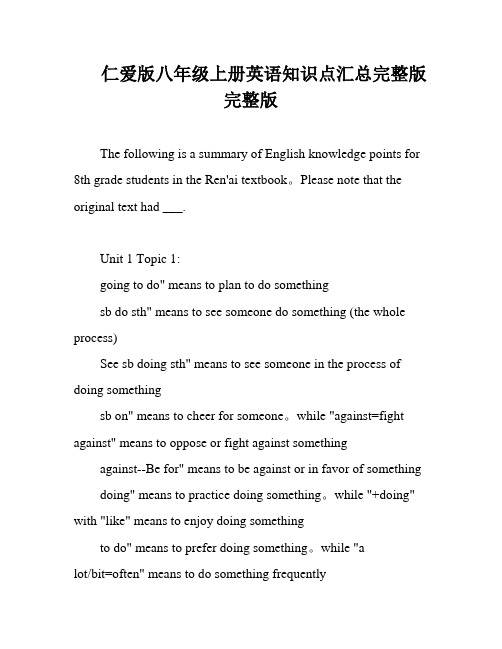
仁爱版八年级上册英语知识点汇总完整版完整版The following is a summary of English knowledge points for 8th grade students in the Ren'ai textbook。
Please note that the original text had ___.Unit 1 Topic 1:going to do" means to plan to do somethingsb do sth" means to see someone do something (the whole process)See sb doing sth" means to see someone in the process of doing somethingsb on" means to cheer for someone。
while "against=fight against" means to oppose or fight against somethingagainst--Be for" means to be against or in favor of something doing" means to practice doing something。
while "+doing" with "like" means to enjoy doing somethingto do" means to prefer doing something。
while "alot/bit=often" means to do something frequentlywhat kind of" means which one。
初中英语 仁爱版八年级上册Unit1 Topic2知识点
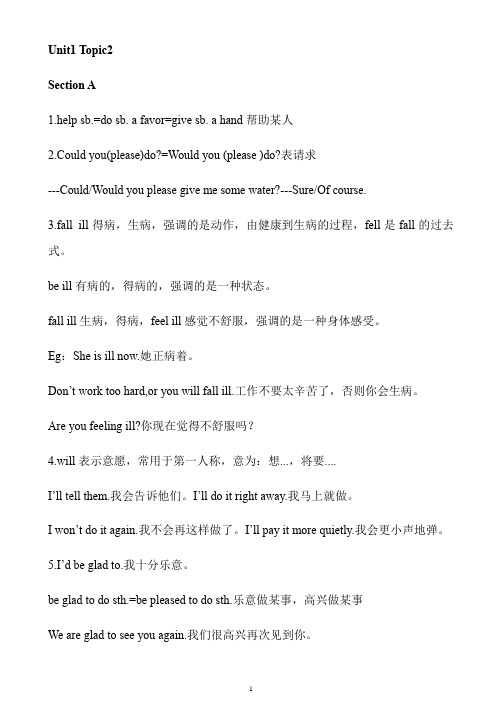
Unit1 Topic2Section A1.help sb.=do sb. a favor=give sb. a hand帮助某人2.Could you(please)do?=Would you (please )do?表请求---Could/Would you please give me some water?---Sure/Of course.3.fall ill得病,生病,强调的是动作,由健康到生病的过程,fell是fall的过去式。
be ill有病的,得病的,强调的是一种状态。
fall ill生病,得病,feel ill感觉不舒服,强调的是一种身体感受。
Eg:She is ill now.她正病着。
Don’t work too hard,or you will fall ill.工作不要太辛苦了,否则你会生病。
Are you feeling ill?你现在觉得不舒服吗?4.will表示意愿,常用于第一人称,意为:想...,将要....I’ll tell them.我会告诉他们。
I’ll do it right away.我马上就做。
I won’t do it again.我不会再这样做了。
I’ll pay it more quietly.我会更小声地弹。
5.I’d be glad to.我十分乐意。
be glad to do sth.=be pleased to do sth.乐意做某事,高兴做某事We are glad to see you again.我们很高兴再次见到你。
6.Would/Do you mind+doing sth.?你介意做某事吗?/如果...可以吗?/请你...好不好?常用来表示委婉的请求,或用来表示希望得到对方的许可。
回答时如果表示“可以”,要说Not at all./Of course not./Certainly not./No problem.当然不介意。
仁爱版八年级上册unit2知识点
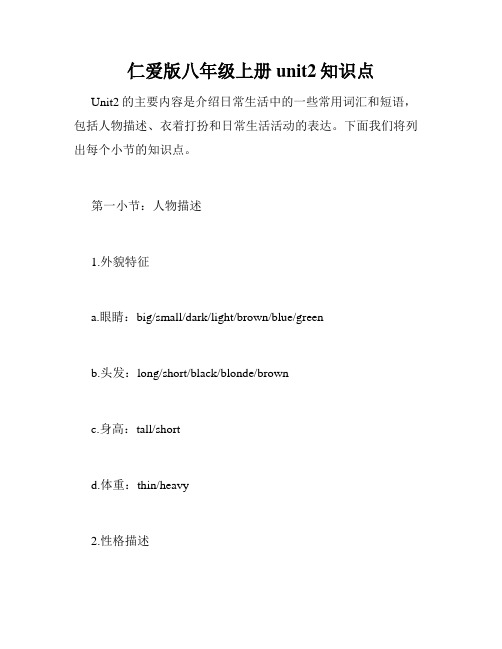
仁爱版八年级上册unit2知识点Unit2的主要内容是介绍日常生活中的一些常用词汇和短语,包括人物描述、衣着打扮和日常生活活动的表达。
下面我们将列出每个小节的知识点。
第一小节:人物描述
1.外貌特征
a.眼睛:big/small/dark/light/brown/blue/green
b.头发:long/short/black/blonde/brown
c.身高:tall/short
d.体重:thin/heavy
2.性格描述
a.开朗:outgoing/friendly
b.安静:quiet/shy
c.勇敢:brave
d.有礼貌:polite
第二小节:衣着打扮
1.上衣:T-shirt/sweater/shirt/blouse
2.裤子:jeans/pants/shorts
3.鞋子:sneakers/sandals/boots
4.配饰:necklace/bracelet/watch/earrings 第三小节:日常活动表达
1. 问路:Excuse me, can you tell me the way to...?
2. 看病:I feel sick. I need to see a doctor.
3. 看电影:Would you like to go to the movies with me?
4. 离开:Goodbye. Have a nice day.
本节重点:
1.掌握常用词汇和短语。
2.熟练应用词汇和短语,能够写出相关的句子和话题。
3.通过看图、听音等多种方式让学生掌握所学内容。
通过本节学习,学生可以扩展自己的词汇量和日常表达能力,从而达到更好的交流效果。
仁爱版英语八年级上册unit2知识点

仁爱版英语八年级上册unit2知识点仁爱版英语八年级上册unit2教学内容主要包括三个方面: 一、词汇;二、语法;三、句型。
一、词汇1. 颜色:红色 red, 黄色 yellow, 蓝色 blue, 黑色 black, 白色 white, 紫色 purple, 绿色 green, 橙色 orange, 粉红色 pink。
2. 衣着:帽子 hat, 外套 coat, 衬衫 shirt, 裤子 trousers/pants, 鞋shoes, 裙子 skirt, T恤 T-shirt, 运动服 tracksuit。
3. 食物:饼干 biscuit, 蛋糕 cake, 冰淇淋 ice cream, 汉堡包hamburger, 薯条 chips,面包 bread, 牛奶 milk, 面条 noodles, 炸鸡fried chicken。
4. 学科:地理 geography, 历史 history, 数学 maths, 音乐 music, 物理 physics, 外语 foreign language, 文学 literature。
二、语法1. 一般现在时:肯定句:主语+动词原形+s/es,如 He likes playing basketball.否定句:主语+does not/do not+动词原形,如 He does not like watching TV.疑问句:Does/Do+主语+动词原形?如 Does he like playing basketball?2. 连词and 表示并列,如 He is tall and handsome.or 表示选择,如 Would you like coffee or tea?but 表示转折,如 He is not rich but happy.3. 物主代词:my 我的, your 你的, his 他的, her 她的, its 它的, our 我们的, your 你们的, their 他们的。
仁爱版八年级上册英语知识点总结详细版

仁爱版八年级上册英语知识点总结详细版本文档总结了仁爱版八年级上册英语的知识点,以供参考。
Unit 1: Greetings and Introductions- Greetings: Hello, Hi, Good morning, Good afternoon, Good evening- Introduction: My name is..., I am from..., Nice to meet you, How are you?Unit 2: School Life- Subjects: English, Math, Science, History- Classroom objects: desk, chair, board, book, pen- School activities: study, read, write, listen, speakUnit 3: Family- Family members: father, mother, brother, sister- Relationships: parents, grandparents, siblings- Describing family members: tall, short, young, oldUnit 4: Hobbies and Interests- Hobbies: playing sports, listening to music, reading books- Leisure activities: watching movies, playing games, hanging out with friendsUnit 5: Food and Drinks- Food items: rice, noodles, chicken, beef, vegetables- Drinks: water, milk, tea, juiceUnit 6: Daily Routine- Daily activities: wake up, brush teeth, have breakfast, go to school - Time expressions: in the morning, in the afternoon, in the eveningUnit 7: Travel and Transportation- Modes of transportation: car, bus, train, bicycle- Travel destinations: city, beach, countrysideUnit 8: Holidays and Celebrations- Festivals: Christmas, Easter, New Year- Celebrations: birthday, wedding, graduation以上是仁爱版八年级上册英语的知识点总结,希望对你有所帮助!。
八年级上英语仁爱版知识点

八年级上英语仁爱版知识点本篇文章将为大家介绍八年级上英语仁爱版的基础知识点,主要包括单词、语法、听力和阅读方面的内容。
希望能够为广大学生提供学习上的帮助。
一、单词1. 表示时间的单词:Monday,Tuesday,Wednesday,Thursday,Friday,Saturday,Sunday,morning,afternoon,evening,night等。
2. 表示家庭关系的单词:father,mother,brother,sister,grandpa,grandma等。
3. 表示身体部位的单词:eye,ear,nose,mouth,head,shoulder,arm,hand,finger,leg,foot等。
二、语法1. 时态:一般现在时,一般过去时,将来时等。
2. 代词:主格代词,宾格代词,物主代词等。
3. 名词:可数名词,不可数名词,复数形式等。
4. 形容词:形容词的比较级和最高级,形容词修饰名词的用法等。
5. 副词:副词的基本用法,修饰动词和形容词的用法等。
三、听力1. 听力理解:听力内容包括日常生活中的对话、短文和广播等。
2. 听力技巧:认真听每个单词,集中注意力,把握重要信息,尝试推测答案等。
3. 听力练习:可以通过听录音、看短片或者与朋友交流等方式进行听力训练。
四、阅读1. 阅读理解:阅读内容包括日常生活中的短文,广告和新闻报道等。
2. 阅读技巧:首先,把握文章主题,然后找出重点信息;尝试猜测单词的意思;识别文章中的语法结构等。
3. 阅读练习:可以通过看英文小说、阅读报纸或者与朋友一起阅读等方式进行阅读训练。
以上就是八年级上英语仁爱版的基础知识点介绍,相信这些基础知识点的掌握可以帮助学生更好地学习英语。
希望大家能够认真学习,取得优异的成绩。
(完整版)仁爱版英语八年级上知识点归纳

Topic 1 What’s your favorite sport?重点词语:1. almost(反义词)never2.win(过去式)won(名词)winner3.ski(现在分词)skiing4.famous(比较级)more famous5.arrive(同义词)reach6.leave(过去式))left7.popular(最高级)most popular 8.healthy(同义词)fit(名词)health(1) 词组1. during the summer holidays 在暑假期间2. between…and…在两者之间3. cheer sb. on 为某人加油4. prefer doing sth. 更喜欢做某事5. quite a bit/a lot 很多6. plan to do sth. 计划做某事7. have a skating club 举办滑雪俱乐部8. go skating/skiing/bicycling/climbing/hiking 去滑雪/滑冰/骑车/爬山/远足9. arrive in 到达10. play against…与……对抗/较量11. for long 很久12. leave for…动身去…13. the day after tomorrow 后天14. places of interest 名15. 胜16. play baseball 打棒球17. at least 至少18. be good at 善于做某事19. take part in 参加20. all over the world 全世界21. be good for 对……有益22. a good way 一种好方法23. keep fit/healthy 保持健康24. relax oneself 放松某人自己重点句型25. What’s your favorite sport? = What sport do you like best? 你最喜爱的运动是什么?26. Which sport do you prefer? = Which sport do you like better? 你更喜欢什么运动?I prefer skating. = I like skating better. 我更喜欢滑雪.27. Do you skate much? = Do you often skate? 你常滑雪吗?28. She spends at least half an hour in the gym every day. 每天她至少花半小时在体育馆.29. She plays baseball pretty well and she is also good at jumping.她棒球打得相当好而且擅长于跳.30. What kind of sports do you like? = Which sport do you like? 你喜欢哪种运动? 重点语言点31. see sb. do sth “看见某人做了某事” 强调动作的全过程,常与every day; often 等连用.see sb. doing sth. “看见某人正在做某事” 强调动作正在进行.如: I saw you play basketball almost every day during the summer holidays.I often see him draw pictures near the river. 我常看见她在河边画画.I saw her go across the street. 我看见她过了马路I saw her going across the street. 我看见她正在过马路.[类似的有watch,hear,feel 等这类感观动词.]32. join sb. 表示“加入某人的行列” “和某人在一起”join + 组织表示“加入某个组织”take part in 表示“参加/出席某个活动”如: Will you join us?I will join the skiing club.She is planning to take part in the high jump.33. arrive in + 大地点arrive at + 小地点get to + 地点= reach + 地点如: My uncle arrived in Beijing yesterday.I arrived at the Great Wall. = I got to the Great Wall. = I reached the Great Wall. 注意: reach here/there/home = get here/there/home = arrive here/there/home34. leave… 离开……leave for… 动身去…/离开到…如: They are leaving Beijing tomorrow. 明天他们要离开北京.They are leaving for Japan the day after tomorrow. 后天他们要前往日本.35. a few “几个;一些” 修饰可数名36. 词a little “一点点” 修饰不数名词如: There are a few eggs in the basket.There is a little water in the bottle.37. how long 表示“多久(时间)”; 提问时间段.how often 表示“多常; 多久一次”; 提问时间的频率.如: They will stay in Beijing for a week. → How long will they stay in Beijing?He plays basketball twice a week. →How often does he play basketball?7.be good at (doing) sth. = do well in (doing) sth. 擅长于(做)某事如: She is good at (playing) baseball. = She does well in (playing) baseball.8.make sth/sb + adj. 使某物(某人)在某种状态keep …sth/sb + adj.保持某物(某人)在某种状态如: Playing soccer can make your body strong.Swimming can help to keep your heart and lungs healthy.重点语法一般将来时:(一)be going to 结构: ①表示主语进行某一将来行动的打算、意图。
初中英语 仁爱版八年级上册Unit1Topic1知识点
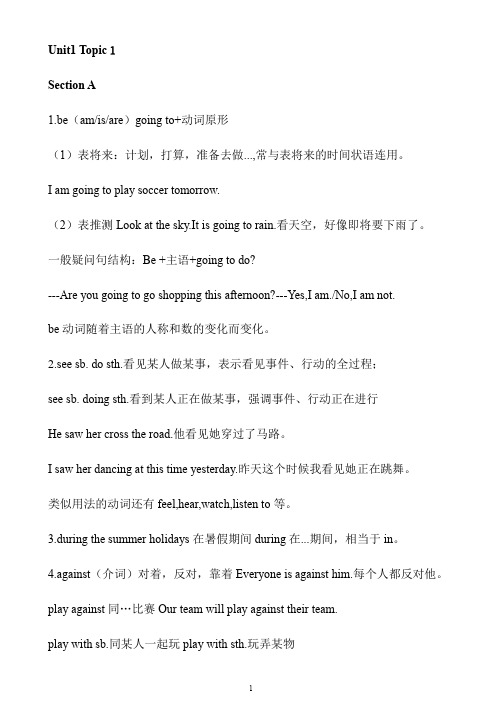
Unit1 Topic1Section A1.be(am/is/are)going to+动词原形(1)表将来:计划,打算,准备去做...,常与表将来的时间状语连用。
I am going to play soccer tomorrow.(2)表推测Look at the sky.It is going to rain.看天空,好像即将要下雨了。
一般疑问句结构:Be +主语+going to do?---Are you going to go shopping this afternoon?---Yes,I am./No,I am not.be动词随着主语的人称和数的变化而变化。
2.see sb. do sth.看见某人做某事,表示看见事件、行动的全过程;see sb. doing sth.看到某人正在做某事,强调事件、行动正在进行He saw her cross the road.他看见她穿过了马路。
I saw her dancing at this time yesterday.昨天这个时候我看见她正在跳舞。
类似用法的动词还有feel,hear,watch,listen to等。
3.during the summer holidays在暑假期间during在...期间,相当于in。
4.against(介词)对着,反对,靠着Everyone is against him.每个人都反对他。
play against同…比赛Our team will play against their team.play with sb.同某人一起玩play with sth.玩弄某物I often play with my friends. The cat is playing with a ball.against作为介词,还有“紧靠;倚”的意思。
Eg:Put the piano there,against the wall.把钢琴放在那,紧靠着墙。
仁爱英语八年级上unit1知识点归纳

仁爱英语八年级上unit1知识点归纳Unit1的主要内容是介绍学校生活和相关的词汇、表达方式。
下面是Unit1里的知识点归纳:一、学校设施和场所1.1 Classroom(教室)Classroom是学校里最常见的场所,我们需要掌握下面的表达方式:(1)Where is your classroom?(你的教室在哪里?)(2)My classroom is on the second floor.(我的教室在二楼。
)(3)Where is the teacher’s desk?(老师的讲台在哪里?)(4)The teacher’s desk is in front of the blackboard.(老师的讲台在黑板前面。
)1.2 Library(图书馆)图书馆是学校非常重要的场所之一,我们需要掌握下面的表达方式:(1)Where is the library?(图书馆在哪里?)(2)The library is beside the playground.(图书馆在操场旁边。
)(3)What can we do in the library?(在图书馆里我们能做什么?)(4)We can read books and study in the library.(我们可以在图书馆里读书和学习。
)1.3 Playground(操场)操场是学生们放松和运动的场所,我们需要掌握下面的表达方式:(1)Where is the playground?(操场在哪里?)(2)The playground is behind the classroom building.(操场在教学楼后面。
)(3)What can we do on the playground?(在操场上我们可以做什么?)(4)We can play basketball, football and other sports on the playground.(我们可以在操场上打篮球、足球和其他运动。
初中英语仁爱版八年级上册知识点梳理(共计59页)
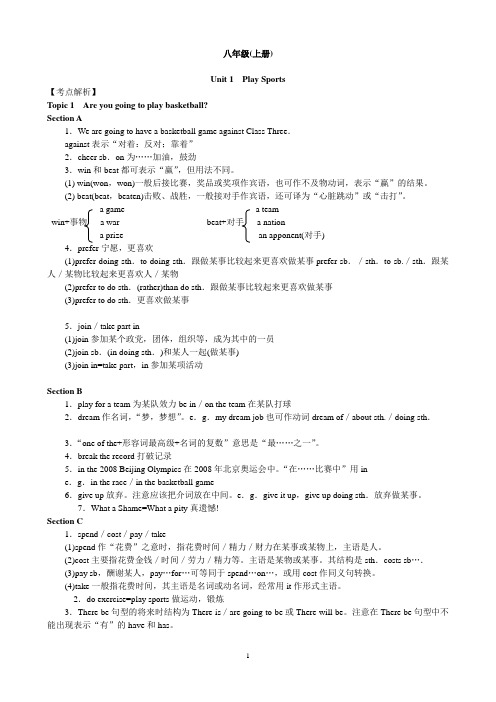
八年级(上册)Unit 1 Play Sports【考点解析】Topic 1 Are you going to play basketball?Section A1.We are going to have a basketball game against Class Three.against表示“对着:反对;靠着”2.cheer sb.on为……加油,鼓劲3.win和beat都可表示“赢”,但用法不同。
(1) win(won,won)一般后接比赛,奖品或奖项作宾语,也可作不及物动词,表示“赢”的结果。
(2) beat(beat,beaten)击败、战胜,一般接对手作宾语,还可译为“心脏跳动”或“击打”。
a game a teamwin+事物 a war beat+对手 a nationa prize an apponent(对手)4.prefer宁愿,更喜欢(1)prefer doing sth.to doing sth.跟做某事比较起来更喜欢做某事prefer sb./sth.to sb./sth.跟某人/某物比较起来更喜欢人/某物(2)prefer to do sth.(rather)than do sth.跟做某事比较起来更喜欢做某事(3)prefer to do sth.更喜欢做某事5.join/take part in(1)join参加某个政党,团体,组织等,成为其中的一员(2)join sb.(in doing sth.)和某人一起(做某事)(3)join in=take part,in参加某项活动Section B1.play for a team为某队效力be in/on the team在某队打球2.dream作名词,“梦,梦想”。
e.g.my dream job也可作动词dream of/about sth./doing sth.3.“one of the+形容词最高级+名词的复数”意思是“最……之一”。
八年级仁爱上册英语知识点

八年级仁爱上册英语知识点八年级仁爱上册英语是初中英语课程中的一部分,是指学生在中国大陆进行的第二年英语课学习。
下面是八年级仁爱上册英语课程的主要知识点:1. 动词时态:包括一般现在时、一般过去时、一般将来时、现在进行时、过去进行时、现在完成时、过去完成时、将来完成时、过去将来时等九种时态。
2. 代词:包括人称代词、物主代词、反身代词、相互代词、不定代词等,通过代词的使用可以使英语语言更具备连贯性和简洁性。
3. 副词:是修饰动词、形容词、其他副词、句子或者句子部分的词语,可以表示时间、地点、方式、程度等等。
4. 名词:是指用来表示人、物、动物、植物等等的名称,包括可数名词和不可数名词。
名词可以进行复数形式的变化,同时也可以进行所有格形式的变化。
5. 形容词:用来描述,区分同类事物的形容词,包括比较级、最高级等形式,同时还可以进行名词修饰的作用。
6. 冠词:是指英语表达中最基本的语法符号之一,主要用来指示所描述的名词的身份和数量。
7. 介词短语:用来描述事物在时间、地点等方面的关系,主要由介词和名词组成。
8. 从句:是构成英语语言中复杂句式的关键,包括定语从句、主语从句、宾语从句等等。
9. 句型:包括陈述句、疑问句、祈使句和感叹句等。
10. 短语动词:短语动词是指由主要动词加上一些小品词构成的动词短语,它可以为英语语言提供更多的语法表达和表达深度。
11. 翻译:英语学习的一个重要环节是翻译,可以通过其来提高听、读、写、说等四种语言技能。
以上内容是八年级仁爱上册英语课程的主要知识点,希望可以给正在学习中的同学提供帮助,让他们可以更好地掌握这门语言。
八年级上册仁爱版英语知识点

八年级上册仁爱版英语知识点(经典版)编制人:__________________审核人:__________________审批人:__________________编制单位:__________________编制时间:____年____月____日序言下载提示:该文档是本店铺精心编制而成的,希望大家下载后,能够帮助大家解决实际问题。
文档下载后可定制修改,请根据实际需要进行调整和使用,谢谢!并且,本店铺为大家提供各种类型的经典范文,如工作报告、工作计划、活动方案、规章制度、演讲致辞、合同协议、条据文书、教学资料、作文大全、其他范文等等,想了解不同范文格式和写法,敬请关注!Download tips: This document is carefully compiled by this editor. I hope that after you download it, it can help you solve practical problems. The document can be customized and modified after downloading, please adjust and use it according to actual needs, thank you!Moreover, our store provides various types of classic sample essays, such as work reports, work plans, activity plans, rules and regulations, speeches, contract agreements, documentary evidence, teaching materials, complete essays, and other sample essays. If you would like to learn about different sample formats and writing methods, please pay attention!八年级上册仁爱版英语知识点八年级上册仁爱版英语知识点梳理其实,学习效率的高低,是一个学生综合学习能力的体现。
仁爱英语八年级上册知识点归纳【四篇】
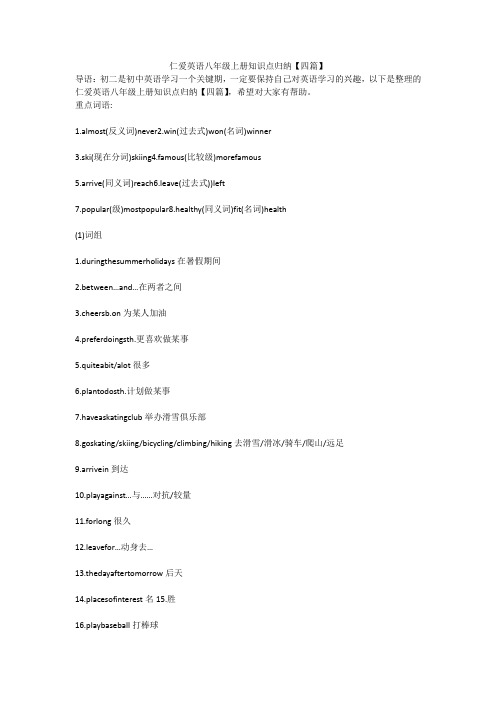
仁爱英语八年级上册知识点归纳【四篇】导语:初二是初中英语学习一个关键期,一定要保持自己对英语学习的兴趣,以下是整理的仁爱英语八年级上册知识点归纳【四篇】,希望对大家有帮助。
重点词语:1.almost(反义词)never2.win(过去式)won(名词)winner3.ski(现在分词)skiing4.famous(比较级)morefamous5.arrive(同义词)reach6.leave(过去式))left7.popular(级)mostpopular8.healthy(同义词)fit(名词)health(1)词组1.duringthesummerholidays在暑假期间2.between…and…在两者之间3.cheersb.on为某人加油4.preferdoingsth.更喜欢做某事5.quiteabit/alot很多6.plantodosth.计划做某事7.haveaskatingclub举办滑雪俱乐部8.goskating/skiing/bicycling/climbing/hiking去滑雪/滑冰/骑车/爬山/远足9.arrivein到达10.playagainst…与……对抗/较量11.forlong很久12.leavefor…动身去…13.thedayaftertomorrow后天14.placesofinterest名15.胜16.playbaseball打棒球17.atleast至少18.begoodat善于做某事19.takepartin参加20.allovertheworld全世界21.begoodfor对……有益22.agoodway一种好方法23.keepfit/healthy保持健康24.relaxoneself放松某人自己重点句型25.What’syourfavoritesport?=Whatsportdoyoulikebest?你最喜爱的运动是什么?26.Whichsportdoyouprefer?=Whichsportdoyoulikebetter?你更喜欢什么运动? Ipreferskating.=Ilikeskatingbetter.我更喜欢滑雪.27.Doyouskatemuch?=Doyouoftenskate?你常滑雪吗?28.Shespendsatleasthalfanhourinthegymeveryday.每天她至少花半小时在体育馆.29.Sheplaysbaseballprettywellandsheisalsogoodatjumping.她棒球打得相当好而且擅长于跳.30.Whatkindofsportsdoyoulike?=Whichsportdoyoulike?你喜欢哪种运动?重点语言点31.seesb.dosth“看见某人做了某事”强调动作的全过程,常与everyday;often等连用. seesb.doingsth.“看见某人正在做某事”强调动作正在进行.如:Isawyouplaybasketballalmosteverydayduringthesummerholidays. Ioftenseehimdrawpicturesneartheriver.我常看见她在河边画画.Isawhergoacrossthestreet.我看见她过了马路Isawhergoingacrossthestreet.我看见她正在过马路.[类似的有watch,hear,feel等这类感观动词.]32.joinsb.表示“加入某人的行列”“和某人在一起”join+组织表示“加入某个组织”takepartin表示“参加/出席某个活动”如:Willyoujoinus?Iwilljointheskiingclub. Sheisplanningtotakepartinthehighjump.33.arrivein+大地点arriveat+小地点getto+地点=reach+地点如:MyunclearrivedinBeijingyesterday.IarrivedattheGreatWall.=IgottotheGreatWall.=IreachedtheGreatWall.注意:reachhere/there/home=gethere/there/home=arrivehere/there/home 34.leave…离开……leavefor…动身去…/离开到…如:TheyareleavingBeijingtomorrow.明天他们要离开北京. TheyareleavingforJapanthedayaftertomorrow.后天他们要前往日本.35.afew“几个;一些”修饰可数名36.词alittle“一点点”修饰不数名词如:Thereareafeweggsinthebasket.Thereisalittlewaterinthebottle.37.howlong表示“多久(时间)”;提问时间段.howoften表示“多常;多久一次”;提问时间的频率.如:TheywillstayinBeijingforaweek.→HowlongwilltheystayinBeijing?Heplaysbasketballtwiceaweek.→Howoftendoesheplaybasketball?7.begoodat(doing)sth.=dowellin(doing)sth.擅长于(做)某事如:Sheisgoodat(playing)baseball.=Shedoeswellin(playing)baseball.8.makesth/sb+adj.使某物(某人)在某种状态keep…sth/sb+adj.保持某物(某人)在某种状态如:Playingsoccercanmakeyourbodystrong.Swimmingcanhelptokeepyourheartandlungshealthy.重点语法一般将来时:(一)begoingto结构:①表示主语进行某一将来行动的打算、意图。
完整版)仁爱版八年级上册英语知识点汇总(完整版)

完整版)仁爱版八年级上册英语知识点汇总(完整版)Unit 1 Topic 1: English Phrases for 8th Grade1."Be going to do" means to plan to do something.2."See sb do sth" means to witness someone doing something (the entire process)。
"See sb doing sth" means to witness someone in the middle of doing something.3."XXX.4."Play against" means to XXX.5."Be against" means to oppose something。
"Be for" means to support something.6."Practice + doing" means to practice doing something.7."Prefer + doing" means to like something more than something else.8."Prefer + doing/n。
to doing/n." means to like doing something more than something else.9."Prefer to do" means to prefer doing something over something else.10."Quite a lot/bit" means often.11."Which" means what kind of。
英语八上知识点总结仁爱版

英语八上知识点总结仁爱版英语八上是初中英语学习的重要阶段,本篇文章将为您详细总结仁爱版英语八上的知识点,帮助您巩固所学,提高英语水平。
一、词汇部分1.名词:学习了一般名词、专有名词、可数名词和不可数名词的用法。
2.冠词:掌握了不定冠词a/an的用法,以及定冠词the的用法。
3.代词:学习了人称代词、物主代词、指示代词、反身代词、疑问代词和不定代词的用法。
4.形容词:学习了形容词的比较级和最高级,以及一些常用形容词的用法。
5.副词:学习了副词的比较级和最高级,以及一些常用副词的用法。
6.动词:学习了动词的时态、语态、非谓语动词等知识点。
7.介词:掌握了常用介词的用法,如in、on、at、by、with、for、from 等。
8.连词:学习了并列连词、从属连词的用法,如and、but、or、because、if、although等。
二、句型部分1.疑问句:学习了一般疑问句、选择疑问句、特殊疑问句和反意疑问句的构成及用法。
2.祈使句:掌握了祈使句的肯定式和否定式。
3.感叹句:学习了由what和how引导的感叹句。
4.简单句:巩固了主谓宾、主系表句型,学习了There be句型。
5.并列句:掌握了由并列连词连接的并列句。
6.复合句:学习了由从属连词引导的宾语从句、状语从句、定语从句等。
三、语法部分1.动词时态:学习了现在进行时、一般过去时、一般将来时、现在完成时等时态。
2.被动语态:掌握了被动语态的构成和用法。
3.句子结构:学习了简单句、并列句、复合句的构成。
4.状语从句:学习了时间状语从句、地点状语从句、原因状语从句、条件状语从句等。
5.定语从句:学习了关系代词和关系副词的用法。
四、阅读与写作1.阅读理解:学习了如何根据文章内容回答问题,提高阅读理解能力。
2.写作:掌握了书信、日记、看图作文等写作技巧。
总结:通过学习仁爱版英语八上的知识点,希望大家能够扎实掌握英语基础,为今后的英语学习打下坚实基础。
在复习过程中,注意查漏补缺,提高自己的英语水平。
仁爱版八年级上册英语知识点总结

八年级上英语语法1) leave的用法1.“leave+地点”表示“离开某地”。
例如:When did you leave Shanghai你什么时候离开上海的?2.“leave for+地点”表示“动身去某地”。
例如:Next Friday, Alice is leaving for London.下周五,爱丽斯要去伦敦了。
3.“leave+地点+for+地点”表示“离开某地去某地”。
例如:Why are you leaving Shanghai for Beijing你为什么要离开上海去北京?2) 情态动词should“应该”学会使用should作为情态动词用,常常表示意外、惊奇、不能理解等,有“竟会”的意思,例如:How should I know 我怎么知道?Why should you be so late today 你今天为什么来得这么晚?should有时表示应当做或发生的事,例如:We should help each other.我们应当互相帮助。
我们在使用时要注意以下几点:1. 用于表示“应该”或“不应该”的概念。
此时常指长辈教导或责备晚辈。
例如:You should be here with clean hands. 你应该把手洗干净了再来。
2. 用于提出意见劝导别人。
例如:You should go to the doctor if you feel ill. 如果你感觉不舒服,你最好去看医生。
3. 用于表示可能性。
should的这一用法是考试中常常出现的考点之一。
例如:We should arrive by supper time. 我们在晚饭前就能到了。
She should be here any moment. 她随时都可能来。
31. what 与which 都是疑问代词,都可以指人或事物,但是what仅用来询问职业。
如:What is your father 你父亲是干什么的?该句相当于:What does your father doWhat is your father's jobWhich 指代的是特定范围内的某一个人。
